SAC
-
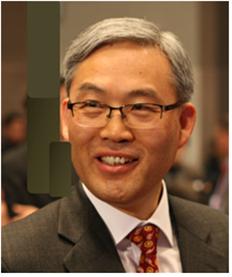 Professor Chun-Taek Rim Appointed as Associate Editor for IEEE TPEL
Professor Chun-Taek Rim of the nuclear and quantum engineering at KAIST was appointed as an associate editor of the Institute of Electrical and Electronics Engineers (IEEE) Transactions on Power Electronics (TPEL), an eminent academic journal bio-monthly published in the field of power electronics.The journal has a high impact factor (4.08), a measure reflecting the average number of citations to recent articles published in an academic journal, which ranks as the 6th the most influential journal among the 100 journals published by IEEE.Professor Rim was also appointed to an associate editor for IEEE Journal of Emerging and Selected Topics in Power Electronics in September in recognition of his expertise in wireless power and electric vehicles.
2013.11.15 View 12063
Professor Chun-Taek Rim Appointed as Associate Editor for IEEE TPEL
Professor Chun-Taek Rim of the nuclear and quantum engineering at KAIST was appointed as an associate editor of the Institute of Electrical and Electronics Engineers (IEEE) Transactions on Power Electronics (TPEL), an eminent academic journal bio-monthly published in the field of power electronics.The journal has a high impact factor (4.08), a measure reflecting the average number of citations to recent articles published in an academic journal, which ranks as the 6th the most influential journal among the 100 journals published by IEEE.Professor Rim was also appointed to an associate editor for IEEE Journal of Emerging and Selected Topics in Power Electronics in September in recognition of his expertise in wireless power and electric vehicles.
2013.11.15 View 12063 -
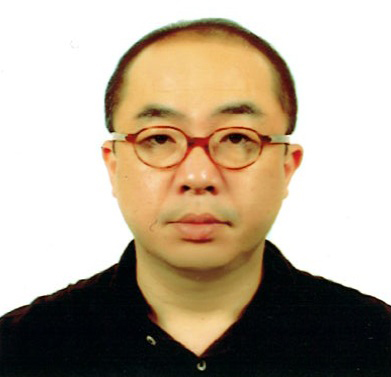 Prof. Song Chong received the IEEE William R. Bennett Prize Paper Award
The IEEE (Institute of Electrical and Electronics Engineers) Communications Society (ComSoc), a renowned global network of professionals with a common interest in advancing communications technologies, has announced the winner of the 2013 William R. Bennett Prize in the field of communications networking. The prize was given to a Korean research team led by Song Chong, Professor of Electrical Engineering at KAIST and Injong Rhee, Professor of Computer Science at North Carolina State University. In addition, Dr. Minsu Shin, Dr. Seongik Hong, and Dr. Seong Joon Kim of Samsung Electronics Co., Ltd. as well as Professor Kyunghan Lee from Ulsan National Institute of Science and Technology were recognized for their contribution.
The William R. Bennett Prize for communications networking has been awarded each year since 1994 in recognition of the best paper published in any journal financially sponsored or co-sponsored by ComSoc in the previous three calendar years. Only one paper per year is selected based on its quality, originality, scientific citation index, and peer reviews. Among the previous award winners are Robert Gallager of MIT, and Steven Low of the California Institute of Technology, and Kang G. Shin of the University of Michigan.
The Korean research team’s paper, On the Levy-Walk Nature of Human Mobility, was published in the June 2011 issue of IEEE/ACM Transactions on Networking, a bimonthly journal co-sponsored by the IEEE ComSoc, the IEEE Computer Society, and the Association for Computing Machinery (ACM) with its Special Interest Group on Data Communications (SIGCOMM).
In the paper, the research team proposed a new statistical model to effectively analyze the pattern of individual human mobility in daily life. The team handed out GPS (global positioning system) devices to 100 participants residing in five different university campuses in Korea and the US and collected data on their movements for 226 days. The mobility pattern obtained from the experiment predicted accurately how the participants actually moved around during their routines. Since publication, the paper has been cited by other papers approximately 350 times.
The team’s research results will apply to many fields such as the prevention and control of epidemics, the design of efficient communications networks, and the development of urban and transportation system.
The research team received the award on June 10th at the 2013 IEEE International Conference on Communications (ICC) held in Budapest, Hungary, from June 9-13, 2013.
Professor Song Chong
2013.07.06 View 15705
Prof. Song Chong received the IEEE William R. Bennett Prize Paper Award
The IEEE (Institute of Electrical and Electronics Engineers) Communications Society (ComSoc), a renowned global network of professionals with a common interest in advancing communications technologies, has announced the winner of the 2013 William R. Bennett Prize in the field of communications networking. The prize was given to a Korean research team led by Song Chong, Professor of Electrical Engineering at KAIST and Injong Rhee, Professor of Computer Science at North Carolina State University. In addition, Dr. Minsu Shin, Dr. Seongik Hong, and Dr. Seong Joon Kim of Samsung Electronics Co., Ltd. as well as Professor Kyunghan Lee from Ulsan National Institute of Science and Technology were recognized for their contribution.
The William R. Bennett Prize for communications networking has been awarded each year since 1994 in recognition of the best paper published in any journal financially sponsored or co-sponsored by ComSoc in the previous three calendar years. Only one paper per year is selected based on its quality, originality, scientific citation index, and peer reviews. Among the previous award winners are Robert Gallager of MIT, and Steven Low of the California Institute of Technology, and Kang G. Shin of the University of Michigan.
The Korean research team’s paper, On the Levy-Walk Nature of Human Mobility, was published in the June 2011 issue of IEEE/ACM Transactions on Networking, a bimonthly journal co-sponsored by the IEEE ComSoc, the IEEE Computer Society, and the Association for Computing Machinery (ACM) with its Special Interest Group on Data Communications (SIGCOMM).
In the paper, the research team proposed a new statistical model to effectively analyze the pattern of individual human mobility in daily life. The team handed out GPS (global positioning system) devices to 100 participants residing in five different university campuses in Korea and the US and collected data on their movements for 226 days. The mobility pattern obtained from the experiment predicted accurately how the participants actually moved around during their routines. Since publication, the paper has been cited by other papers approximately 350 times.
The team’s research results will apply to many fields such as the prevention and control of epidemics, the design of efficient communications networks, and the development of urban and transportation system.
The research team received the award on June 10th at the 2013 IEEE International Conference on Communications (ICC) held in Budapest, Hungary, from June 9-13, 2013.
Professor Song Chong
2013.07.06 View 15705 -
 Prof. Jong Chul Ye Appointed as the Editor of IEEE TIP
Professor Jong Chul Ye
KAIST Bio & brain engineering department’s Professor Jong Chul Ye has been appointed as the editor of the "IEEE image processing transactions (IEEE TIP, IEEE Transaction on Image Processing)’, a prominent journal in the sector of imaging and medical image processing.
Professor Ye will act as the editor in the field of medical imaging from February 2013 to January 2016, during which he will participate in examining thesis, establishing the direction of the journal and more.
Professor Jong Chul Ye was recognized for his notable work in the field of medical imaging research using compressed sensing for the development of a high resolution medical image reconstruction techniques. This technique has pioneered a new area that is applicable in magnetic resonance imaging (MRI), computed tomography (CT), positron emission Camcorder (PET) and brain imaging.
On the other hand, “IEEE TIP” was first published in 1992 and is currently the world’s leading authority in the field of image processing, medical imaging, image acquisition, compression and output.
2013.02.21 View 11674
Prof. Jong Chul Ye Appointed as the Editor of IEEE TIP
Professor Jong Chul Ye
KAIST Bio & brain engineering department’s Professor Jong Chul Ye has been appointed as the editor of the "IEEE image processing transactions (IEEE TIP, IEEE Transaction on Image Processing)’, a prominent journal in the sector of imaging and medical image processing.
Professor Ye will act as the editor in the field of medical imaging from February 2013 to January 2016, during which he will participate in examining thesis, establishing the direction of the journal and more.
Professor Jong Chul Ye was recognized for his notable work in the field of medical imaging research using compressed sensing for the development of a high resolution medical image reconstruction techniques. This technique has pioneered a new area that is applicable in magnetic resonance imaging (MRI), computed tomography (CT), positron emission Camcorder (PET) and brain imaging.
On the other hand, “IEEE TIP” was first published in 1992 and is currently the world’s leading authority in the field of image processing, medical imaging, image acquisition, compression and output.
2013.02.21 View 11674 -
 New wireless charging device developed
The On-line Electric Vehicle (OLEV) developed by KAIST has made a step towards commercialization with the development of a more economic wireless charging device.
Professor Chun-Taek Rim from the Department of Nuclear and Quantum Engineering at KAIST has developed a new I-shaped wireless charging device that differs from the pre-existing rail-type electricity feeder. This device can be modularly produced and requires relatively less construction, significantly reducing the cost of implementation.
The KAIST OLEV is a new concept electric car that has a special electricity collecting device underneath it. The car’s battery is charged by magnetic fields produced from electric lines buried 15cm underneath the road. The vehicle was first tested in 2009, making it the first wireless electric car in the world. OLEV can be charged during stoppage time between traffic lights and receives real-time power when running. OLEV is currently in operation at the KAIST Munji Campus in Daejeon and is also being exhibited at the Yeosu Expo and Seoul Grand Park.
The device itself has a charging capacity of 15kW, and the electricity is supplied through an electricity feeder with a width of 80cm with a space interval of 20cm. Despite being hailed as a technological breakthrough and revolutionary concept, KAIST OLEV has been criticized for problems in commercialization, due to the difficulties in installing wires beneath existing roads, which costs a considerable amount of money.
The new I-shaped wireless charging device reduces the width of the electricity feeder by 10cm, a mere one-eighth of the size of the previous version, and greatly increases the charging power to 25kW. Furthermore, the left and right permissible space of automobiles has increased to 24cm and the magnetic field complies with the international design guidelines, making the OLEV safe for the human body.
The reduction of the width has made the mass production of modules possible, making the installation of KAIST OLEV more economical and marketable. Professor Rim emphasized that compared with the existing rail-type electricity feeder, the new technology will need only one-tenth of the construction time and 80% of the cost, significantly improving OLEV’s constructability and workability.
The research was published in the IEEE Transactions on Power Electronics last December, and Professor Rim was invited to talk at the Conference on Electric Roads & Vehicles, which was held in February in the United States, about the new technology.
2012.07.06 View 13005
New wireless charging device developed
The On-line Electric Vehicle (OLEV) developed by KAIST has made a step towards commercialization with the development of a more economic wireless charging device.
Professor Chun-Taek Rim from the Department of Nuclear and Quantum Engineering at KAIST has developed a new I-shaped wireless charging device that differs from the pre-existing rail-type electricity feeder. This device can be modularly produced and requires relatively less construction, significantly reducing the cost of implementation.
The KAIST OLEV is a new concept electric car that has a special electricity collecting device underneath it. The car’s battery is charged by magnetic fields produced from electric lines buried 15cm underneath the road. The vehicle was first tested in 2009, making it the first wireless electric car in the world. OLEV can be charged during stoppage time between traffic lights and receives real-time power when running. OLEV is currently in operation at the KAIST Munji Campus in Daejeon and is also being exhibited at the Yeosu Expo and Seoul Grand Park.
The device itself has a charging capacity of 15kW, and the electricity is supplied through an electricity feeder with a width of 80cm with a space interval of 20cm. Despite being hailed as a technological breakthrough and revolutionary concept, KAIST OLEV has been criticized for problems in commercialization, due to the difficulties in installing wires beneath existing roads, which costs a considerable amount of money.
The new I-shaped wireless charging device reduces the width of the electricity feeder by 10cm, a mere one-eighth of the size of the previous version, and greatly increases the charging power to 25kW. Furthermore, the left and right permissible space of automobiles has increased to 24cm and the magnetic field complies with the international design guidelines, making the OLEV safe for the human body.
The reduction of the width has made the mass production of modules possible, making the installation of KAIST OLEV more economical and marketable. Professor Rim emphasized that compared with the existing rail-type electricity feeder, the new technology will need only one-tenth of the construction time and 80% of the cost, significantly improving OLEV’s constructability and workability.
The research was published in the IEEE Transactions on Power Electronics last December, and Professor Rim was invited to talk at the Conference on Electric Roads & Vehicles, which was held in February in the United States, about the new technology.
2012.07.06 View 13005 -
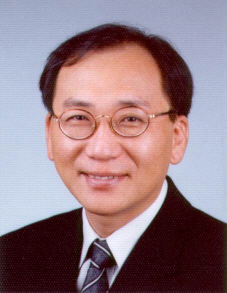 Professor Young-Ho Cho elected as head of international academic conference
KAIST’s Professor Young-Ho Cho of the Department of Bio and Brain Engineering was appointed as the head of the PowerMems (Power Micro Electro Mechanical Systems) symposium to be held at Se-Jong Hotel in Seoul from November 15-18, 2011.
Professor Jo is America’s first engineering doctor in the field of MEMS and is the founding member of the BSAC (Berkeley Sensor and Actuator Center), the start of the MEMS technology.
PowerMEMS is the core of green growth and next generation energy production. It focuses on harvesting energy from minute vibrations or renewable energy sources such as sunlight or plants to harvest and store energy via micro or even nano size systems.
The symposium was first held in 2000, and it is where leading experts in the field share papers on the production and harvesting energy in the micro scale.
2011.01.14 View 12813
Professor Young-Ho Cho elected as head of international academic conference
KAIST’s Professor Young-Ho Cho of the Department of Bio and Brain Engineering was appointed as the head of the PowerMems (Power Micro Electro Mechanical Systems) symposium to be held at Se-Jong Hotel in Seoul from November 15-18, 2011.
Professor Jo is America’s first engineering doctor in the field of MEMS and is the founding member of the BSAC (Berkeley Sensor and Actuator Center), the start of the MEMS technology.
PowerMEMS is the core of green growth and next generation energy production. It focuses on harvesting energy from minute vibrations or renewable energy sources such as sunlight or plants to harvest and store energy via micro or even nano size systems.
The symposium was first held in 2000, and it is where leading experts in the field share papers on the production and harvesting energy in the micro scale.
2011.01.14 View 12813 -
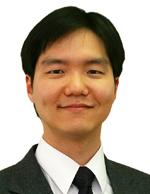 A KAIST graduate to become a professor at a prestigious university in UAE
A KAIST graduate to become a professor at a prestigious university in UAE
Dr. Jerald Yoo, a KAIST graduate, has been appointed as an assistant professor at the Masdar Institute of Science and Technology (MIST) in Abu Dhabi, United Arab Emirates (UAE), by the recommendation of the Massachusetts Institute of Technology (MIT) since April 1, 2010.
The MIST is a private, not-for-profit, independent, research-driven institute developed with the support and cooperation of MIT and the Abu Dhabi government, which was opened in September 2009. Currently, at the school, there are 25 professors and 100 students from 22 countries around the world. The institute has a campus in Masdar City where the Abu Dhabi government plans to nurture it as a “place for zero carbon emissions.”
According to an agreement between the MIST and MIT, Professor Yoo will teach and work on co-research projects at MIT for one year beginning in May 2010 and then working at the MIST thereafter.
Professor Yoo received all of his degrees (BS, MS, and Ph.D.) from KAIST majoring in electrical engineering and earned his doctoral degree in January 2010. His research works included developing a wearable patch to monitor bio signals with an application of wearable sensor networks and low energy electronic circuit technologies. During his doctoral study, Professor Yoo published papers at the IEEE International Solid-State Circuits Conference (ISSCC) and in journals of IEEE Solid-State Circuits Society (SSCS).
Professor Yoo said, "The wearable health care system is certainly necessary to improve the quality of our lives, and the field should receive a sustaining support for further research. I will do my best to continuously produce valuable research results and hope that my research works will be helpful for an academic exchange between South Korea and Abu Dhabi.”
About the Masdar Institute of Science and Technology (MIST) in Abu Dhabi:
http://www.masdar.ac.ae/
The Masdar Institute is the centerpiece of the Masdar Initiative, a landmark program announced in April 2006 by the government of Abu Dhabi to establish an entirely new economic sector dedicated to alternative and sustainable energy. Masdar is a highly-strategic initiative with primary objectives of: helping drive the economic diversification of Abu Dhabi; maintaining and expanding Abu Dhabi"s position in evolving global energy markets; positioning Abu Dhabi as a developer of technology; and making a meaningful contribution towards sustainable human development.
The Masdar Institute is a private, not-for-profit, independent, research-driven institute developed with the support and cooperation of the Massachusetts Institute of Technology (MIT). The Institute offers Masters and (eventually) PhD programs in science and engineering disciplines, with a focus on advanced energy and sustainable technologies. It welcomes and encourages applications from qualified local and international students and provides fellowships to talented students who meet its high admission standards. Its faculty is of the highest quality and the intent is to have the structure of its top administration similar to MIT"s.
2010.04.13 View 14709
A KAIST graduate to become a professor at a prestigious university in UAE
A KAIST graduate to become a professor at a prestigious university in UAE
Dr. Jerald Yoo, a KAIST graduate, has been appointed as an assistant professor at the Masdar Institute of Science and Technology (MIST) in Abu Dhabi, United Arab Emirates (UAE), by the recommendation of the Massachusetts Institute of Technology (MIT) since April 1, 2010.
The MIST is a private, not-for-profit, independent, research-driven institute developed with the support and cooperation of MIT and the Abu Dhabi government, which was opened in September 2009. Currently, at the school, there are 25 professors and 100 students from 22 countries around the world. The institute has a campus in Masdar City where the Abu Dhabi government plans to nurture it as a “place for zero carbon emissions.”
According to an agreement between the MIST and MIT, Professor Yoo will teach and work on co-research projects at MIT for one year beginning in May 2010 and then working at the MIST thereafter.
Professor Yoo received all of his degrees (BS, MS, and Ph.D.) from KAIST majoring in electrical engineering and earned his doctoral degree in January 2010. His research works included developing a wearable patch to monitor bio signals with an application of wearable sensor networks and low energy electronic circuit technologies. During his doctoral study, Professor Yoo published papers at the IEEE International Solid-State Circuits Conference (ISSCC) and in journals of IEEE Solid-State Circuits Society (SSCS).
Professor Yoo said, "The wearable health care system is certainly necessary to improve the quality of our lives, and the field should receive a sustaining support for further research. I will do my best to continuously produce valuable research results and hope that my research works will be helpful for an academic exchange between South Korea and Abu Dhabi.”
About the Masdar Institute of Science and Technology (MIST) in Abu Dhabi:
http://www.masdar.ac.ae/
The Masdar Institute is the centerpiece of the Masdar Initiative, a landmark program announced in April 2006 by the government of Abu Dhabi to establish an entirely new economic sector dedicated to alternative and sustainable energy. Masdar is a highly-strategic initiative with primary objectives of: helping drive the economic diversification of Abu Dhabi; maintaining and expanding Abu Dhabi"s position in evolving global energy markets; positioning Abu Dhabi as a developer of technology; and making a meaningful contribution towards sustainable human development.
The Masdar Institute is a private, not-for-profit, independent, research-driven institute developed with the support and cooperation of the Massachusetts Institute of Technology (MIT). The Institute offers Masters and (eventually) PhD programs in science and engineering disciplines, with a focus on advanced energy and sustainable technologies. It welcomes and encourages applications from qualified local and international students and provides fellowships to talented students who meet its high admission standards. Its faculty is of the highest quality and the intent is to have the structure of its top administration similar to MIT"s.
2010.04.13 View 14709 -
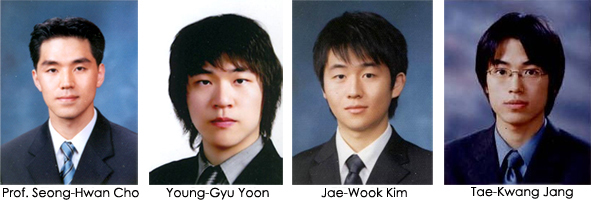 Prof. Cho's Team Awarded Best Paper Prize by IEEE
A team led by Prof. Seong-Hwan Cho of the School of Electrical Engineering and Computer Science, KAIST, won the 2009 Guillemin-Cauer Best Paper Award for their paper published in the IEEE Transactions on Circuits and Systems Journal last May, university authorities said on Thursday (June 4).
The team"s paper was entitled "A Time-based Bandpass ADC Using Time-Interleaved Voltage-Controlled Oscillators." The prize is given to a paper regarded as the best among about 350 papers published in the prestigious journal in the circuit theory area. Co-recipients of the award are Young-Gyu Yoon, Jae-Wook Kim and Tae-Kwang Jang. The award was presented at the annual 2009 International Symposium for Circuits and Systems in Taipei, Taiwan, on May 26.
The Institute of Electrical and Electronics Engineers or IEEE is an international non-profit, professional organization for the advancement of technology related to electricity. The New York-based organization has more than 365,000 members in about 150 countries making it the largest technical professional organization in the world.
2009.06.05 View 16064
Prof. Cho's Team Awarded Best Paper Prize by IEEE
A team led by Prof. Seong-Hwan Cho of the School of Electrical Engineering and Computer Science, KAIST, won the 2009 Guillemin-Cauer Best Paper Award for their paper published in the IEEE Transactions on Circuits and Systems Journal last May, university authorities said on Thursday (June 4).
The team"s paper was entitled "A Time-based Bandpass ADC Using Time-Interleaved Voltage-Controlled Oscillators." The prize is given to a paper regarded as the best among about 350 papers published in the prestigious journal in the circuit theory area. Co-recipients of the award are Young-Gyu Yoon, Jae-Wook Kim and Tae-Kwang Jang. The award was presented at the annual 2009 International Symposium for Circuits and Systems in Taipei, Taiwan, on May 26.
The Institute of Electrical and Electronics Engineers or IEEE is an international non-profit, professional organization for the advancement of technology related to electricity. The New York-based organization has more than 365,000 members in about 150 countries making it the largest technical professional organization in the world.
2009.06.05 View 16064